Justificatio sola fide, meaning justification by faith alone, is a Christian theological doctrine commonly held to distinguish the Reformed and the Lutheran traditions of Protestantism, among others, from the Catholic, Eastern Orthodox and Oriental Orthodox churches. The doctrine asserts that it is on the basis of faith that believers are made right of their transgressions of the law of God rather than on the basis of good works which they have done. This forgiveness is known as "justification". In classical Lutheran and Reformed theologies, good works are seen to be evidence of faith, but the good works themselves do not determine salvation. In contrast, Methodist teaching affirms a belief in justification by faith that offers God's forgiveness, but holds that holy living with the goal of Christian perfection (sanctification) is essential for salvation.

In Western Christian theology, grace is the help given to us by God because God desires us to have it, not necessarily because of anything we have done to earn it. It is understood by Christians to be a spontaneous gift from God to people – "generous, free and totally unexpected and undeserved" – that takes the form of divine favor, love, clemency, and a share in the divine life of God.
The five solae of the Protestant Reformation are a foundational set of principles held by theologians and clergy to be central to the doctrine of salvation as taught by the Reformed branches of Protestantism. Each sola represents a key belief in the Lutheran and Reformed traditions in contradistinction to the teaching of the Roman Catholic Church. These Reformers claimed that the Catholic Church, especially its head, the Pope, had usurped divine attributes or qualities for the Church and its hierarchy.
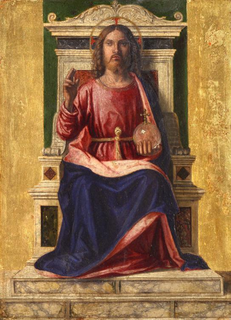
In Christianity, salvation is the "saving [of] human beings from sin and its consequences, which include death and separation from God" by Christ's death and resurrection, and the justification following this salvation.
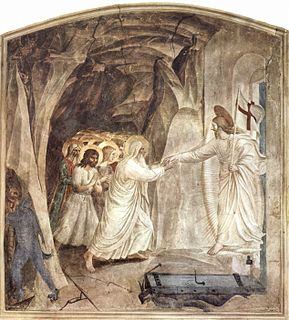
In Christian theology, justification is God's righteous act of removing the condemnation, guilt, and penalty of sin, by grace, while, at the same time, declaring the unrighteous to be righteous, through faith in Christ's atoning sacrifice.

Andreas Osiander was a German Lutheran theologian and Protestant reformer.

Assurance, also known as the Witness of the Spirit, is a Protestant Christian doctrine that states that the inner witness of the Holy Spirit allows the Christian disciple to know that they are justified. Based on the writings of St. Augustine of Hippo, assurance was historically a very important doctrine in Lutheranism and Calvinism, and remains a distinguishing doctrine of Methodism and Quakerism though there are differences among these Christian traditions. Hymns that celebrate the witness of the Holy Spirit, such as "Blessed Assurance" are sung in Christian liturgies to celebrate the belief in assurance.
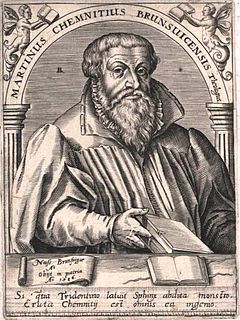
Martin Chemnitz was an eminent second-generation German, Evangelical Lutheran, Christian theologian, and a Protestant reformer, churchman, and confessor. In the Evangelical Lutheran tradition he is known as Alter Martinus, the "Second Martin": Si Martinus non fuisset, Martinus vix stetisset goes a common saying concerning him. He is listed and remembered in the Calendar of Saints and Commemorations in the Liturgical Church Year as a pastor and confessor by both the Evangelical Lutheran Church in America and Lutheran Church–Missouri Synod.
This is a sub-page for the Justification (theology) page.
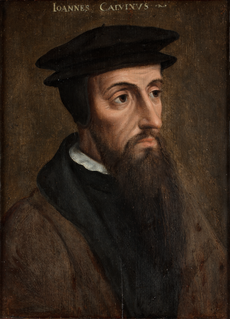
Imputed righteousness is a concept in Christian theology proposing that the "righteousness of Christ ... is imputed to [believers] — that is, treated as if it were theirs through faith." It is on the basis of Jesus' righteousness that God accepts humans. This acceptance is also referred to as justification.

The Treatise on the Power and Primacy of the Pope (1537), The Tractate for short, is the seventh Lutheran credal document of the Book of Concord. Philip Melanchthon, its author, completed it on February 17, 1537 during the assembly of princes and theologians in Smalcald.

In Protestant Christianity, the relationship between Law and Gospel—God's Law and the Gospel of Jesus Christ—is a major topic in Lutheran and Reformed theology. In these religious traditions, the distinction between the doctrines of Law, which demands obedience to God's ethical will, and Gospel, which promises the forgiveness of sins in light of the person and work of Jesus Christ, is critical. Ministers use it as a hermeneutical principle of biblical interpretation and as a guiding principle in homiletics and pastoral care. It involves the supersession of the Old Covenant by the New Covenant and Christian theology.
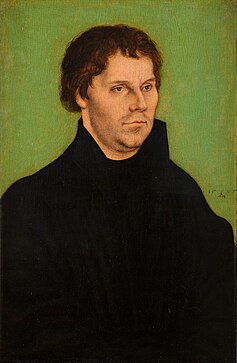
The theology of Martin Luther was instrumental in influencing the Protestant Reformation, specifically topics dealing with Justification by Faith, the relationship between the Law and the Gospel, and various other theological ideas. Although Luther never wrote a "systematic theology" or a "summa" in the style of St. Thomas Aquinas, many of his ideas were systematized in the Lutheran Confessions.
Regeneration, while sometimes perceived to be a step in the Ordo salutis, is generally understood in Christian theology to be the objective work of God in a believer's life. Spiritually, it means that God brings Man to new life or "born again" from a previous state of separation from God and subjection to the decay of death. Thus, in Lutheran and Roman Catholic theology, it generally means that which takes place during baptism. In Calvinism and Arminian theology, baptism is recognized as an outward sign of an inward reality which is to follow regeneration as a sign of obedience to the New Testament; as such, the Methodist Churches teach that regeneration occurs during the New Birth.

Gnesio-Lutherans is a modern name for a theological party in the Lutheran churches, in opposition to the Philippists after the death of Martin Luther and before the Formula of Concord. In their own day they were called Flacians by their opponents and simply Lutherans by themselves. Later Flacian became to mean an adherent of Matthias Flacius' view of original sin, rejected by the Formula of Concord. In a broader meaning, the term Gnesio-Lutheran is associated mostly with the defence of the doctrine of Real Presence.
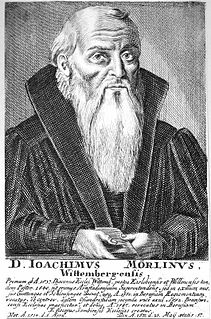
Joachim Mörlin April 5, 1514, Wittenberg, Electorate of Saxony – May 29, 1571, Königsberg, Duchy of Prussia - 1945) was an Evangelical Lutheran theologian and an important figure in the controversies following Martin Luther's (1483-1546) death. He was the older brother of Maximilian Mörlin, another Lutheran theologian and Reformer.
Johann Funck, Funk or Funccius was a German Lutheran theologian. He was beheaded after a court intrigue.
The Two Kinds of Righteousness is a Lutheran paradigm. It attempts to define man's identity in relation to God and to the rest of creation. The Two Kinds of Righteousness is explicitly mentioned in Luther's 1518 sermon entitled Two Kinds of Righteousness, in Luther's Galatians Commentary (1535), in his Bondage of the Will, Melanchthon's Apology of the Augsburg Confession, and in the third article of the Formula of Concord. It is also the implicit presupposition governing Luther's Freedom of a Christian as well as other works.
Maximilian Mörlin was a Lutheran theologian, court preacher, Superintendent in Coburg, and Reformer.
Mark A. Seifrid is a scholar of the New Testament letters of Paul, currently working at Concordia Seminary in St. Louis, Missouri.









